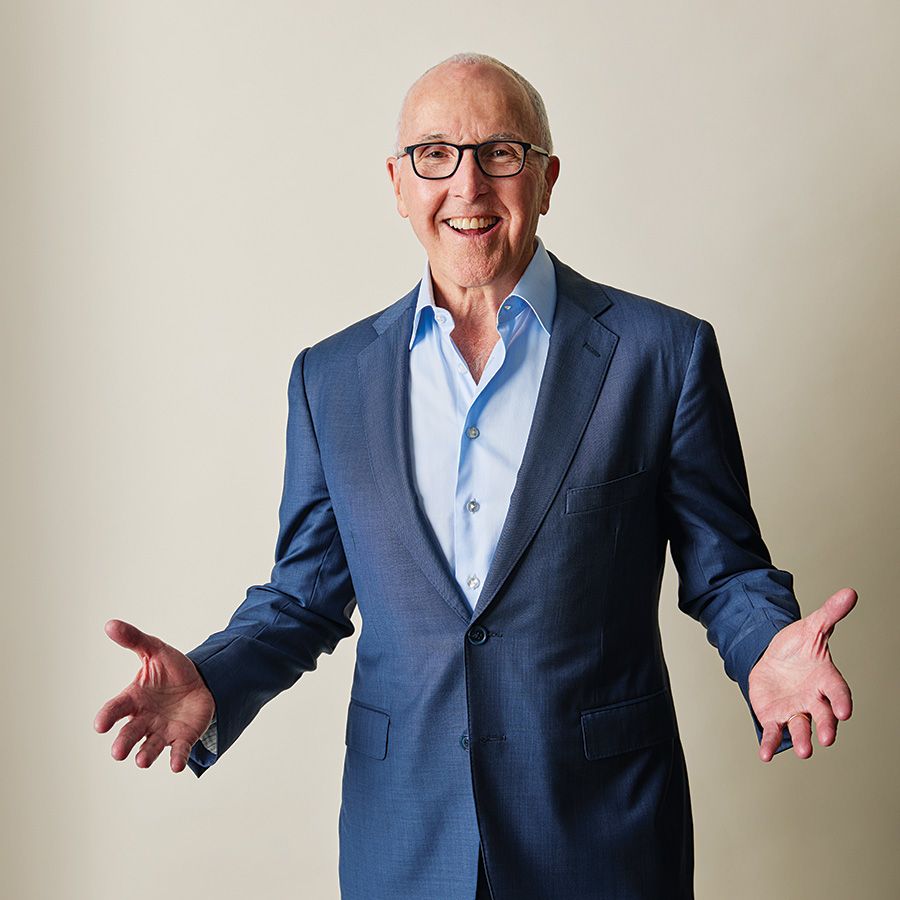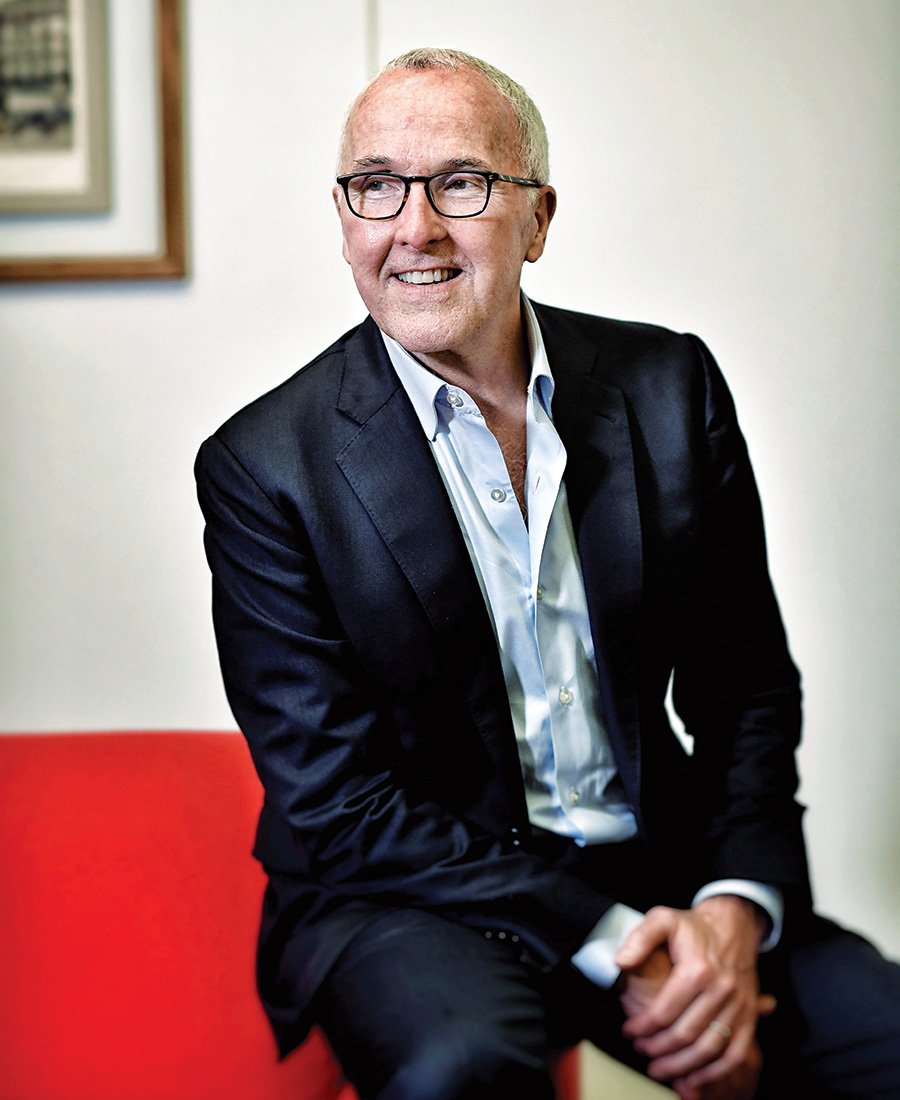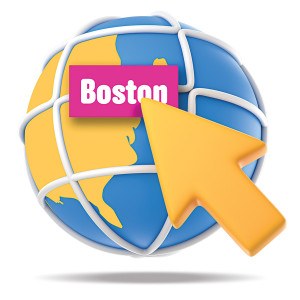Why Is Billionaire Frank McCourt Jr. Mad at Other Billionaires?
The Boston-born magnate and former L.A. Dodgers owner is engaged in the fight of his life: reining in big tech.

Portrait by Ty Mecham
Billionaire Frank McCourt Jr. is mad. Really mad. And he’s not going to take it anymore. The subject of his ire? Other billionaires—specifically the ones behind tech companies that co-opt and exploit their customers’ data, sometimes even using it against them. Best known as the scion of a Boston-based construction giant that helped build modern Boston, the McCourt Global founder and one-time L.A. Dodgers owner is now engaged in the fight of his life: reining in big tech. The 70-year-old magnate has launched an initiative called Project Liberty, written a book that serves as a call to arms, and is putting his money where his mouth is, assembling a high-profile bid to buy the social media platform TikTok. He recently talked to us about his plan to redesign the Internet and preserve our personal liberties, developing the Seaport, and, yes, his infamously ugly divorce.
Your book, Our Biggest Fight, is fascinating, but what makes a successful construction guy an authority on the Internet?
The point here is not to be right, it’s to get this right. It’s to fix what’s pretty obviously broken.
So what needs to be fixed?
The Internet has been co-opted by a few large platforms, and when I refer to “big tech,” that’s shorthand for that. So please understand, I’m not against technology, and there’s lots of technology that works well. What I’m focused on here is the harm being caused by the current architecture of the Internet and, more specifically, how we’re all having our data, our personhood, stripped from us. It’s being aggregated by these big platforms, and Project Liberty is intended to re-imagine how the Internet works. It’s why I wrote the book—not just to highlight the problem but to put forward a solution, a methodology, or a theory for change and for moving forward and reclaiming our lives.
Do you think the problem is getting worse?
I do think the harms are becoming more and more obvious. And by harms, you can take your pick. We’re barely governable. Social media and misinformation and disinformation are undermining democracy. The fabric of our society is being ripped apart. And perhaps most important, and most sadly, it’s harming children. There’s a lot of research indicating that young people are more anxious and more depressed than ever. More thoughts of suicide and, tragically, more young people taking their own lives. And a large part of that can be attributed to social media. So there’s clearly an urgency, and the CEOs of these big tech platforms are not doing anything about it.
Can you pinpoint the exact time when you realized that the Internet had become your Public Enemy Number One?
It was a process. After selling the Dodgers, I helped start a public-policy school at Georgetown University, and at that point in time, I had in mind that perhaps big data could be used in a positive way and that we could get ahead of the problem. But I learned very quickly that big tech moves much too fast for our policymaking apparatus to keep up with it. It became clear to me that this whole thing is upside down, that we all create the data, and we should decide who gets to use it and for what purpose. It’s not Twitter’s data, Facebook’s data, TikTok’s data, Google’s data, or Amazon’s data. It’s our data, our personhood, and we should own it and have agency over it.
Can you compare it to anything else?
If I were the head of the Postal Service and I told you I was going to deliver your mail for free, you might say, “What’s the catch?” And if I said, “Well, I’m going to put a camera and listening device in every room of your house, in your workplace, in your car,” you might say, “Whoa! That’s kind of creepy.” And I’d say, “Yeah, but it’s free. And one other thing. I’m gonna open your mail and read it, and everything I learn is now mine. Your relationships, your ideas, your thoughts, your feelings, your emotions, your behaviors, everything that makes you a human being is now mine. And I get to use it in any way I want.” You’d say, “That’s unfair.” And then I might add one other thing: “I’m going to read your 13-year-old daughter’s diary, and when I discover she’s insecure about her weight, I’m gonna send her stuff to make her feel worse, send her stuff to maybe get her to buy things, so I can profit off her vulnerability, and I’m gonna send her stuff that shows her how to harm herself.” It’s not only creepy and unfair, but it’s harmful and we need to fix it.
What would you like to say to big tech leaders like Mark Zuckerberg?
Return people’s data, their personhood, to each of us. Stop dehumanizing us and stripping us of our data. In the digital era, our data is who we are. It’s not just about where we live, or shop, or what kind of food we like. It’s about how we think and behave, how we emote.
So how can someone retain control over their personal data now?
We’ve put forward a new protocol that will enable exactly that, and more than 800,000 people are now using it. So we know it works. And this new protocol, if adopted at scale, would enable an alternative to the current version of the Internet. We have the technology now to enable all of this. You’ve probably heard people say that we need a digital Bill of Rights. And I say, “No, we need technology that honors and respects the Bill of Rights that we have.”
What’s your digital footprint? Are you on Facebook, Instagram, or TikTok?
I’ve never personally been on any social media platform with the current architecture. I would happily be on social with a different architecture, where I control my identity and my data. Our companies and Project Liberty are all on social media because we have no choice right now. We’re all highly dependent on this technology, which is the sad part of it.
So why buy TikTok, as opposed to allowing it to be banned, as Congress and the president have decided?
We know that the tech part of this works, that we can design and build an alternative Internet where each of us controls our own identity and data. The next challenge is scale, and TikTok offers a fantastic opportunity to actually migrate 170 million users to a better Internet. People love TikTok, and if we don’t create an alternative, it runs the risk of being shut down.
What do you think John McCourt, who founded McCourt Construction, would say to you now?
He would encourage me. He would remind me that I ride on many generations’ worth of shoulders, and he would remind me that it’s incumbent upon all of us to do what’s ethical, moral, and correct and to make life better for the next generation.
Best perk of owning a professional sports team?
I think it’s two things. One, you have the power to make a lot of people happy. And then it’s also something quite important that’s not to be taken lightly, which is that you have a disproportionate voice in the sense that people love sports and pay attention to it. And that’s a big privilege.
How hard was it for you to leave Boston for L.A. in 2004?
It was a big decision. And it was difficult. I put my best foot forward to buy the Red Sox, and that wasn’t meant to be. John, Tom, and Larry bought it, and they’ve done a great job. Then Major League Baseball asked me if I was interested in buying another team, and upon reflection and some prompting by others, I looked at the Dodgers, another wonderful, storied franchise, and I bought it from Rupert Murdoch. It was a privilege, and I enjoyed that time in L.A. immensely, but I was also very happy whenever I returned to Boston, which I’ve always done regularly. I’m a Bostonian through and through, and proud of it.
How ironic is it that John Henry bought the house that you moved out of in Brookline?
Yeah, it’s a nice coincidence.

Courtesy photo
Do you like the way the Seaport has grown?
Well, I had a hand in creating the Seaport, and I’m very proud of that. But it’s no secret that there was some public debate I was part of, where I thought that we could reach a little bit higher in our aspirations for the area. That said, I’m really happy that the Seaport has provided the capacity for the city to grow and flourish, particularly with biotechnology.
Has the father of the Internet, Tim Berners-Lee, read your book?
Yeah, I gave him a copy to read before it was published, and he’s come out in favor of what we’re doing. I’ll let him speak for himself, but the Internet has turned into something different than what he imagined, and our goal is to return it to its original intention, which is a tool that we master, a tool that makes us smarter, not more confused, a tool that advances civilization, not one that creates chaos. And one that empowers individuals, not demotes us into being subjects. This technology should and can open incredible doors for progress, possibility, and amazing invention, but not if it’s designed to exploit us.
Who are some of the other high-profile people who have joined you in this crusade?
Lots of them, because this needs to be a collective action. We actually had a summit that was hosted by MIT and Harvard a few weeks ago, where more than 150 like-minded people showed up to advance the goals and objectives of this project.
So what sources of information do you trust? Where do you get your news?
I rely on a wide array of news sources, so that I’m able to process multiple perspectives. I’m intentional about not living in a bubble, and I use my own reasoning skills and deductive powers and common sense.
Why don’t more people do the same?
This is a highly addictive technology, feeding people what they want to hear and believe. Half of the population is in one camp, where they know they’re 100 percent correct. The other half are in a totally different camp, where they know they’re 100 percent correct. I think we’d be well served by having some humility and recognizing that we don’t, as individuals or as tribes, have all the answers.
You’re someone who has been in the media in ways that aren’t terribly flattering. It can’t feel good to have one of the costliest divorces in California history. What should people understand about someone whose personal life is playing out in public in a way that’s probably very hurtful?
It is hurtful, and it’s wrong. I would just say: Look, I’m a human being. I’m not perfect. I’ve made mistakes. But my life is a lot fuller and richer than one sad experience. To have your life diminished to a divorce because it was juicy and it was something that got clicks is sad. I was a grown man with an incredible family to support me, a network of friends, and people to help get me through what was a very difficult period. But what’s more important is what does a 12- or 14-year-old kid do when they’re depressed, bullied, shamed, and attacked on social media? How do they deal with that? You know, it turned out to be a blessing in disguise for me because I understood a bit about how it all feels.
Does this moment in time feel like a dystopian sci-fi moment à la The Twilight Zone?
No, it feels to me like the opportunity of our lifetimes to go out and solve all the big problems that we have to solve as human beings. How do you solve climate change if we can’t agree on the facts? The same applies to immigration, guns, and women’s rights. The vast majority of people want reasonable outcomes on all of these important matters, but technology and social media, in particular, amplify the extreme viewpoints on both sides. It’s not optimizing for truth. It’s optimizing for the stuff that the extreme fringes want to hear. They’re pitting us against each other, and we need to fix it.

By the Numbers
A Tangled Web
Boston has been at the center of the digital revolution for 35 years and counting.
1989
Year that Tim Berners-Lee, who would later become an MIT professor, invented the World Wide Web.
500
Approximate size, in square feet, of the Harvard dorm room where Mark Zuckerberg wrote the code for Facebook.
7 billion
Market cap, in dollars (at presstime) of Wayfair, the Boston company that ushered in the era of online furniture shopping.
463 million
Number of people who visit the Boston-founded and -based TripAdvisor website each month in search of ideas for their next trip.
0
Number of car e-commerce sites that get more visitors than Cambridge-founded CarGurus.
27
Number of years that elapsed between the time Berners-Lee invented the Web and when he began trying to reform the “monster” he believes he created.
First published in the print edition of the July 2024 issue with the headline, “McCourt vs. Big Tech.”

